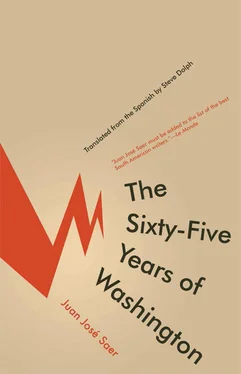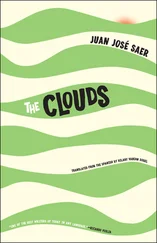Juan José Saer - The Sixty-Five Years of Washington
Здесь есть возможность читать онлайн «Juan José Saer - The Sixty-Five Years of Washington» весь текст электронной книги совершенно бесплатно (целиком полную версию без сокращений). В некоторых случаях можно слушать аудио, скачать через торрент в формате fb2 и присутствует краткое содержание. Год выпуска: 2010, Издательство: Open Letter, Жанр: Современная проза, на английском языке. Описание произведения, (предисловие) а так же отзывы посетителей доступны на портале библиотеки ЛибКат.
- Название:The Sixty-Five Years of Washington
- Автор:
- Издательство:Open Letter
- Жанр:
- Год:2010
- ISBN:нет данных
- Рейтинг книги:3 / 5. Голосов: 1
-
Избранное:Добавить в избранное
- Отзывы:
-
Ваша оценка:
- 60
- 1
- 2
- 3
- 4
- 5
The Sixty-Five Years of Washington: краткое содержание, описание и аннотация
Предлагаем к чтению аннотацию, описание, краткое содержание или предисловие (зависит от того, что написал сам автор книги «The Sixty-Five Years of Washington»). Если вы не нашли необходимую информацию о книге — напишите в комментариях, мы постараемся отыскать её.
The Sixty-Five Years of Washington — читать онлайн бесплатно полную книгу (весь текст) целиком
Ниже представлен текст книги, разбитый по страницам. Система сохранения места последней прочитанной страницы, позволяет с удобством читать онлайн бесплатно книгу «The Sixty-Five Years of Washington», без необходимости каждый раз заново искать на чём Вы остановились. Поставьте закладку, и сможете в любой момент перейти на страницу, на которой закончили чтение.
Интервал:
Закладка:
God damn it! And me in Frankfurt , thinks the Mathematician suddenly. Residue of The Incident. But he forgets it. Owing, apparently, in the era of Temistocles, to a man named Hippodamus, from Miletus they say, tasked with the so-called urbanization of Piraeus, Leto and the Mathematician, ruled by the chess set form of our cities, arrive at the next corner where the intersecting caesura of the cross street interrupts the straight gray line of the sidewalk. They pass from the sun to the shade, from the sidewalk to the street, from the street to the sidewalk, and from the sun to the shade again without changing the rhythm of their pace and without having to stop once, because, as luck would have it, no cars were passing just then on the cross street. The street is so empty that they can keep talking while they cross or, to be more precise, the Mathematician can continue his story — or rather can keep telling Leto the memory he’s been keeping, without having told the outside world a single detail, since the previous Saturday, an opaque and cloudy afternoon on the upper deck of the ferry — the memory, elaborated by Botón’s words and proffered between mouthfuls of chocolate, that he, the Mathematician, no? imagines like this: Barco, the Garay twins, Nidia Basso, and Silvia Cohen start setting the table under the pavilion, the fish continue grilling, the salads sit ready on the stove in the kitchen. There must have been some general commotion before they settled at the table, coming and going from the kitchen, chairs scraping, clinking of plates, of silverware, hesitations — How many are we? The kids already ate, me and Nidia two, Barco, Tomatis, La Chichito, and Beatriz and the twins eight, Botón and Cuello ten, Washington and Marcos Rosemberg twelve (Cohen: I won’t sit, just pick a little from the grill), Silvia thirteen. We’re missing Dib, Pirulo with Rosario, and Sadi and Miguel Ángel — a while must have gone by before they started to eat , thinks the Mathematician.
And he says: It’s the most diverse group you can imagine. In sixty-five years Washington had time to make friends in every sector, and for different reasons: Cuello, for example, who is twenty years younger, was born in the same town and calls him his mentor; Sadi and Miguel Ángel Podio, who are members of the left-wing labor union, admire him because in the twenties Washington published an anarchist newspaper; Pirulo and the Cohens discuss the humanities with him; Basso and his wife, Zen Buddhism; Beatriz (Leto imagines her rolling a cigarette) worked with him on a translation of some nineteenth-century French prose poems. Barco, Tomatis, and the twins are part of this entourage, and Marcos Rosemberg is the only one left in the city from Higinio Gómez’s generation. Botón considers himself a close friend. And me in Frankfurt , thinks the Mathematician. And Leto: I wasn’t invited .
According to Botón, Dib, who after abandoning philosophy opened a mechanics shop, brought three bottles of whiskey, Caballito Blanco , he — Botón, no? — clarified, approvingly, and they started to eat. And Botón says that Barco said (more or less): If we attribute the stumble to chance, it’s obvious a horse can stumble. But if we consider the stumble an accident, that is, deviance from a necessary action, it goes without saying that horses do not stumble. I’m of the chef’s opinion, in that case . And Cohen (also more or less): I don’t have an opinion. I’m only inferring the necessary implications in our notion of instinct . And Beatriz (also more or less and, to Leto, listening to what the Mathematician tells him, constantly rolling a cigarette): If we accept the cook’s notion of instinct, we would come to the conclusion that horses don’t die. Given that instinct is pure necessity, and the first necessity of a living being is its own survival, how can a horse die, given that it’s a living being?
Much more alive than some of us here , says the Mathematician that Botón told him Tomatis said. He can imagine Tomatis saying that from the other end of the table, while he slowly unwraps his fish and scrapes, with his knife blade, the burned skin that may have stuck to the newspaper. Washington, the Mathematician says, wasn’t saying anything. Several in the group must have been waiting for him to open his mouth, but Washington confined himself to eating, bent over his plate with a thoughtful smile, pushing down the mouthfuls from time to time with sips of white wine. Botón, on the upper deck of the ferry, says that Washington didn’t say anything. Botón says , the Mathematician says. Both imagine him: the Mathematician as blonde, curly-haired, with a blonde goatee, eating his chocolate bar to make up for the breakfast he couldn’t eat because he got up too late, the almost transparent clear blue of his eyes, recently showered and combed, getting ready to spend the weekend in Diamante, and Leto as dark-haired, imprecise, his skin dark and covered in acne, his hair straight and unruly, of an almost wiry stiffness, without Leto knowing or ever having asked himself, since he’s never seen him, why the word Botón, which evokes that string of unknown associations, summed up in the characteristics attributed to their name, makes him look like this.
Washington didn’t say anything, no? sitting there with his eyes lowered, leaning over his plate, where his perch sat unwrapped, open, with its filling of parsley and onions, on the charred newspaper page, and in some places fused, or confused rather, with the fish skin. But, according to the Mathematician, his eyes smiled thoughtfully and, two or three times, he was about to say something, lifting his head and looking at the whole gathering who, except for two or three, Beatriz, maybe, or the Centaur, or one of the two twins, El Gato probably, weren’t paying any attention to him. He seemed to be gathering, inside him, the ends of a phrase, of a memory, of something that demands a basic order before it will let itself be spoken — spoken, or rather laid out, articulated, through a sequence of muscular and respiratory combinations, among palpable and impalpable folds of organic material and thought, to the outside world — a familiar music that, even when it comes out in constant and conventional forms, allows itself to be stitched and unstitched in an infinite number of variations.
— Instinct. Set in motion by, the Mathematician says that Beatriz said, and always, and more or less, according to Botón.
— By whom? Or by what? asks Leto.
— What. Probably what. Who, some argue, is already finished, says the Mathematician cryptically.
They’ve left behind the wide, residential section of the street and are now walking down a narrow, treeless sidewalk where more and more frequently the windows and doors of businesses sit open. Bringing the stem of the unlit pipe to his lips, the Mathematician distractedly starts stroking them with the tip, its bowl hidden in his closed hand. He doesn’t say anything now. Above his eyebrows, on his smooth forehead, his skin wrinkles a little, into horizontal furrows, and between the two little blonde brushes appear two oblique fissures, forming a vertex at the bridge of his nose. Leto, meanwhile, remembers: Isabel, the past year, Lopecito, the wake, the closed casket, etc. — and five days before all that, that is, before the wake, Lopecito, etc. no? — as we were, or rather I, yours truly, no? was saying: green wheat, already so tall, from the bus window. He has left Rosario Norte an hour before, with his mother. They’re on their way to Andino, to his maternal grandparents’ house, to spend the weekend. It’s a Friday in late spring. They left Rosario at 1:00. When they leave behind the San Lorenzo industrial complex, the land fills with tall green wheat, fields of flax, and, sometimes, yellow sunflowers right up to the shoulders of the road. Every once in a while they pass a farmhouse, with its windmill and eucalyptus, which interrupts, as they say, the fields, the same way stations divide the scant towns in two like a river or a railroad would in other places in the world. A parallel dirt path separates, in the country, the geometrical grains from the road — and on that path, every once in a while, a solitary carriage travels, hardworking and unreal, which the bus, as slow as it is, leaves behind with ease. He , helpful and enthusiastic, went along to the station. That man who, ever since Leto has had use of his reason, has always been silent, distant, shut away with his unsuspected chimeras in his radio workshop, for the last month or so seems to have broken the bell jar that separated him from the outside world, and has come with them, seeming euphoric, close, warm, and open. Leto observes him at a distance, incredulous. At first the change was so sudden that, in his skepticism, he was sure it was some kind of joke, or a tactical transformation, but his persistence and his conviction to the role were so intense that Leto’s initial incredulity was replaced with doubt — is he? would he? — all that, no? telling himself at the same time, but from then on without concrete ideas or words and almost without realizing it, though not only his mind but also his whole body are for some reason saturated with those senses that more and more resemble the shudder or the silent beating or the contraction of nerves, temples, veins, muscles, telling himself, he would say, but in that way, no? that if it was a comedy the intended audience was Leto himself, because for Isabel, Lopecito, and the rest, who were convinced in advance, no persuasion was necessary — he, Leto no? — the only one who suspected that the man had something up his sleeve, that the man had realized— and decided I was the last obstacle to demolish before his magical circle could finally close, the straggler he had to force in before sealing, hermetically, from the inside, the capsule, and launching it into the interstellar space of his own delirium , Leto thinks, this time with clear and well-formed thoughts, walking, next to the Mathematician, always to the south, on the shady sidewalk, where, more and more frequently, the windows and doors of businesses are open. On a bright, warm, and calm November afternoon, the bus drives past rectangles of blue flax, of yellow sunflowers and green wheat, leaving behind, slow and regular, the repetitive uprights of the telegraph poles, while Leto, sitting next to the window, candidly observes Isabel who, in the seat ahead of him, calmly and serenely flips through the latest issue of Ms & Mrs . The comedy that Leto, after several weeks, has convinced himself is real, produces a tranquilizing and at the same time euphoric effect in Isabel, inasmuch as her old phantasms of marital bliss, upward mobility, sexual satisfaction, economic stability, familial harmony, religious tranquility, and physical well-being have seemed, in recent weeks, to have found their long-awaited substantiation, despite the resistance of a hostile world. Isabel’s attention, detached from the intense perfection of the land, is fixed on the page — a weight-loss plan? the horoscope? an interesting recipe? the opinions of a movie star? sentimental correspondence? Leto doesn’t wonder anymore, feeling nonetheless, indifferently, definitively perhaps, the abyss that separates them. The magazine, elevated almost to her chest, lets him see the belly which, under a modest skirt, ends at the vertex that the crossing muscles form with the pubis — he was in there, for nine months, and then funneled out, fell into the world. What should he feel? First of all, the ubiquitous mother, the amazing plain, fascinates him just then more than his own; the vast world, so indifferent, nevertheless seems more familiar than the one he was raised in at home. His coldness isn’t quite hatred — still, the censure he himself ignores, buried for a long time, feeling now that it’s too late to want them to have been different, makes him see his own feelings as though they were controlled remotely by others, an older and distinct species — not hatred, no, but instead a sort of quiet and curious outrage that makes him observe them constantly to see how far they’ll go, with the wild hope that, after so much time, with laughter and a shift in pose, they will finally say: Okay, that’s enough, show’s over, time to start being our real selves . He, the kind and helpful man, has gone with them to the bus station, in Rosario Norte, has given the impression, for the last month, of being something else, not his real self, but still very different — his concentrated detachment has become lightheartedness; his distracted indifference, friendly attention; his limp and depressive inertia regarding his family and work, enthusiasm and projects. The day before, he came out of the workshop with his eyes tired from connecting so many thin cables and adjusting so many tiny screws, and while he helped Isabel get dinner ready and set the table, he told Leto that next week, when they came back home, they would go fishing together; they would cross the river on a canoe with Lopecito and camp on the island for a couple of days. He even rang up Lopecito who, of course, sounded excited. And in Rosario Norte, just as they were getting on the bus, he, that man, reminded him: on Wednesday, at the latest, because Lopecito was busy Monday and Tuesday, they would row to the island. In fact, Leto has to put effort into showing that he finds the outing as attractive as Lopecito and his father seem to, but the slightly irked, wary curiosity these altered people inspire allows him to give himself over, to persist, with the same affected detachment one would use to observe the behavior of a colony of laboratory mushrooms, in acting out the different scenes of the comedy, hoping to finally unravel the heart of the plot and its characters. Many years later he will understand, from the overwhelming evidence, that the so-called human soul never had, or will ever have, what they call substance or essence, that what they call character, style, personality, are nothing but senseless replications, and that their own subject — the body where they manifest — is the one most starved of their nature, that what others call life is a series of a posteriori recognitions of the places where a blind, incomprehensible, ceaseless drift deposits, in spite of themselves, the eminent individuals who, after having been dragged through it, begin to elaborate systems that pretend to explain it; but for now, having just turned twenty, he still believes that problems have solutions, situations outcomes, individuals personality, and actions logic. Leto observes, with some pleasure, the countryside through the window. Every ten or fifteen kilometers the bus stops at a station for a few minutes to drop off or pick up bags of mail, travelers, the ticket taker, the shopkeepers returning from their restocking trips to Rosario, the packets of newspapers and magazines, the passengers going from one town to another, few compared to those coming from Rosario, as though contact among those towns were prohibited and it was only possible for them to connect by way of the abstract and distant city, those towns on the plains, squared off like the country, regularly and strictly consisting of two rows of houses, most of unplastered brick, four blocks long, one on each side of the highway and separated — each row of houses, no? — from the bus station by a wire fence, a windmill, and a wide dirt street — and on the ends of the four blocks, two lateral streets that close the quadrilateral and rise slightly at the shoulder, towns that are, to put it one way, like a miserly concession from the plains to roughen, at brief and regular intervals, its simplistic, monotonous geometry. To Leto those towns are childhood — that is, in his case, the coming and going by train or by bus, the vacations, in winter or summer, at his grandparents’ house, his grandfather’s general store with its big, dark shelves, the colored fabrics, patterned with flowers, stripes, polka dots, blocks, or with little black and white flowers, stacked on top of each other and lined up diagonally in the cases, the carefully situated yellow bags of sod, the logo and the letters of the brand repeated on several rows, the pyramids of identical cans of preserves, piled up at the back of the store, the bins of caramels, the rows of cigarette packs organized by brand, the ones with blonde tobacco on the left side of the case, with black tobacco in the middle, toscanos, toscanitos, matches, loose tobacco, and rolling paper on the right, the big bins of sugar, of lentils, of garbanzos, of noodles, the rows of dried cod, stiff and covered with rock salt, the harvesting bags smelling of leather and oil, the bottles of wine, by type, by brand, by size, the glass cases with toiletries, the cooler, the scales, the wood countertop, smooth, dark, and weathered, the calendars and the cardboard advertisements with pictures of movie stars, of soccer teams, funny or artistic drawings, the shoeboxes, the kerosene cans and cooking alcohol in the storeroom, next to rows of detergent, flour, salt, oil, and above all, the boxes of Quaker Oats with the drawing of a man holding a smaller box of Quaker Oats with a smaller man holding an even smaller box of Quaker Oats with an even smaller man holding, no? an even smaller, no? to infinity, no? like. . no? childhood, we were saying, or rather yours truly was saying, or rather, that is to say, no? childhood: internal construction and external wandering, convalescence of nothing, corporeal truth versus social fiction, hope of pleasure versus generalized deception, just like that thing on Sundays, the pursuit, torture, and murder of grasshoppers and frogs between the trees in the back yard, the terrifying nights under the crucifix hanging on the headboard with dried olive branches from the last Palm Sunday, the white nightgowns of his aunts, cousins, grandmother, his uncles drinking cold beer under the trees, the afternoon, the whistles of the express passing through town and filling it with fear, the childhood Leto is already starting to tell himself, without words or concepts — not even with images or representations, no? — Isn’t what I had expected. It’s still not what I think it should be like. This can’t be all there is .
Читать дальшеИнтервал:
Закладка:
Похожие книги на «The Sixty-Five Years of Washington»
Представляем Вашему вниманию похожие книги на «The Sixty-Five Years of Washington» списком для выбора. Мы отобрали схожую по названию и смыслу литературу в надежде предоставить читателям больше вариантов отыскать новые, интересные, ещё непрочитанные произведения.
Обсуждение, отзывы о книге «The Sixty-Five Years of Washington» и просто собственные мнения читателей. Оставьте ваши комментарии, напишите, что Вы думаете о произведении, его смысле или главных героях. Укажите что конкретно понравилось, а что нет, и почему Вы так считаете.












